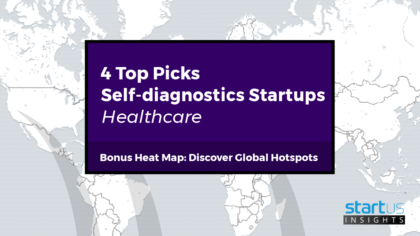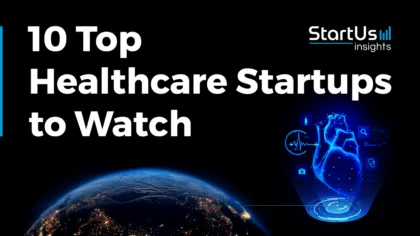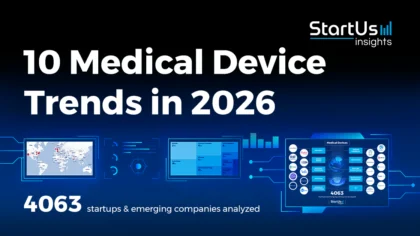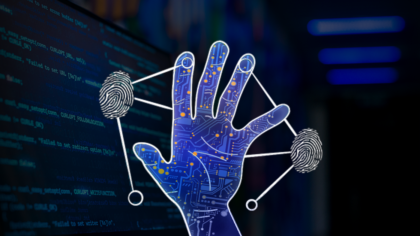Accelerate Productivity in 2025
Reignite Growth Despite the Global Slowdown
Our Innovation Analysts recently looked into emerging technologies and up-and-coming startups in the healthcare industry. As there is a large number of startups working on a wide variety of solutions, we want to share our insights with you. This time, we are taking a look at 4 promising self-diagnostic solutions.
Heat Map: 4 Top Self-Diagnostic Startups
For our 4 picks of self-diagnostic startups, we used a data-driven startup scouting approach to identify the most relevant solutions globally. The Global Startup Heat Map below highlights 4 interesting examples out of 495 relevant solutions. Depending on your specific needs, your top picks might look entirely different.
Tatakoto – Portative Laboratories
Novel solutions such as bringing mobile labs to people’s homes enable performing a wide array of health tests using just a microfluid sample. This way of testing people is one of the main measures to flatten the curve during pandemics, such as the Coronavirus. Suspect cases don’t need to leave their homes, thereby minimizing the risk that they spread the infection further.
The UK-based Tatakoto designs a device for monitoring health indicators through self-dependent urine and blood tests right at home. It’s a reliable and easy to use device consisting of a disposable combo cartridge, which works based on an automated laboratory method called immunochromatography. It tests for up to 150 different blood and 8 urine parameters and provides instant results.
BioLert – Wearable Monitoring & Alert Systems
Experts in the fields of IT, mobile technology, and medicine develop software applications for people suffering from diseases with periodic seizures or crisis. They automatically and continuously monitor vital signs via smartwatches to detect a seizure, record the event, and alerts caregivers in real-time on their patient’s location.
The Israeli company BioLert develops a software product that monitors patients with epilepsy to detect episodes and notify caregivers or family members when an event occurs. Via the user’s personal smartwatch or smartphone, the product records all tracked vital signs and data (including video and audio, if available) and automatically saves it to the cloud.
Alertgy – Body Patches
Advanced materials and smart sensors, integrated into sophisticated patches that are connected with a smartphone application, allow for checking a patient’s body conditions and collect their vital signs.
The US-based company Alertgy works on a non-invasive early detection monitoring patch for diabetic patients. Their wristband reads blood sugar levels on demand and continuously monitor changes. It also sends alerts to notify patient, relatives, caregivers, or others if blood sugar levels go too low or too high.
FibriCheck – Smartphone Camera-Based Monitoring
The technology embedded in smartphones helps physicians and consumers easily capture biometrics and visually presents it to the user as a graphic interface for easily observing one’s health status. Dedicated smartphone applications assess physiologic parameters, including respiration rate and heart rate, temperature, oxygen saturation, blood pressure, etc. It also tracks behavioral activities such as exercising, sleeping, and eating.
The Belgian startup FibriCheck develops a screening and monitoring application for the detection of irregular heart rhythm, including atrial fibrillation and other arrhythmias. All the information is automatically shared with a medical professional in order to get a faster diagnosis, resulting in an adequate treatment plan.
What About The Other 491 Self-Diagnostic Startups?
While we believe data is key to creating insights it can be easy to be overwhelmed by it. Our ambition is to create a comprehensive overview and provide actionable innovation intelligence for your Proof of Concept (PoC), partnership, or investment targets. The 4 self-diagnostic startups showcased above are promising examples out of 495 we analyzed for this article. To identify the most relevant solutions based on your specific criteria and collaboration strategy, get in touch.








